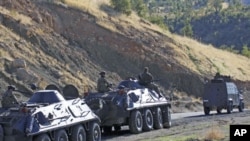Turkey's recent military operations against the Kurdish rebel PKK - reportedly was one of the largest in the past decade - is the latest step in Ankara's battle against the terrorist group, which has bases in neighboring northern Iraq. Previous operations have proved to have limited effect, however, and Turkey is now considering its options in ending the violent insurgency.
Thousands of soldiers backed by tanks and helicopters spent a week tracking down rebels, who killed 24 soldiers and led a series of cross-border raids earlier this month. The PKK has been battling the Turkish state for greater minority rights and local autonomy since 1984.
Metehan Demir, who reports on defense issues for the Turkish newspaper Hurriyet, said that like the previous 30 or so military operations since the 1990's, the latest military response will have limited results. He said Turkey is considering the idea of creating a buffer zone in Iraq to prevent future rebel incursions, but there are problems with this idea.
"Turkey has been thinking this solution for a long time, but it has not been that easy for Turkey [to] establish a buffer zone, because the Iraqi administration will not accept it, as well," said Demir. "If you look at today's condition, they don't even accept Turkey's current cross-border operation. Also, behind the scenes the U.S. will not allow Turkey to establish a buffer zone."
Controlling mountain passes on the Iraqi side of the border has long been seen as the only way of curtailing PKK insurgents entering Turkey from their bases in Iraq. Turkey has had a military presence in the Iraqi border region for more than a decade. But observers say that expanding that presence and establishing a buffer zone will meet with resistance from the semi-autonomous Iraqi Kurdish administration, which controls the region.
Turkish Foreign Minister Ahmet Davutoglu said last week that Ankara's patience was running out. He said the regional administration in the north of Iraq should either prevent the terrorist structure or cooperate with Turkey. If not, he said Turkish forces will enter and stop them themselves. He said that is a right that stems from international law.
Turkey's increasingly strong stance against the PKK rebel threat is backed by Washington. Former Turkish Brigadier General Haldun Solmazturk, a veteran of previous Iraqi incursions, said Ankara would only have attempted such an operation with tacit U.S. support.
"Now we understand there is a common understanding reached by both sides, Turks and Americans, on which such operations could be conducted," said Solmazturk.
U.S. Secretary of State Hillary Clinton condemned the recent attacks by the PKK and expressed the United States' continued cooperation with Turkey to combat violent extremism.
Washington offered no criticism of Turkey's latest operations, despite increasing concern from Baghdad and the local Iraqi Kurdish leadership.
Turkey Takes Strong Stance Against Kurdish Rebel PKK
- By Dorian Jones












